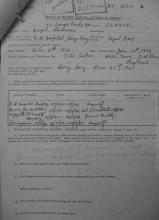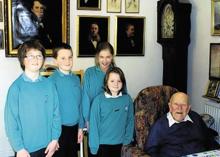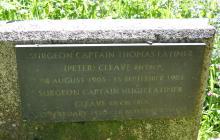- Surgeon-Commander, Royal Navy , 1941 (1) (2)
- The Principal Medical Officer of Hong Kong Royal Naval Hospital , 1941
- FEPOW Liberation Questionnaire : Became a prisoner of war and was interned in Hong Kong Argyle St. Camp - POW Camp 'N' (1942 - 1944), Japan Shinagawa POW Camp (1944 - 1945)
- After the war, he was appointed Surgeon to King George VI, where he served the King on HMS Vanguard. In 1961, he received the prestigious appointment of Honorary Surgeon to the Queen.
- He was later decorated (OBE 1946, CBE 1967), the citation reading :
The Principal Medical Officer was a surgeon commander, R.N. He was later decorated, the citation reading : This officer worked untiringly in the interests of prisoners-of-war until his removal to Japan (Shinagawa Hospital) on April 20, 1944. He did at least a dozen urgent abdominal operations in the most primitive conditions. The Japanese refused to allow him to take his instruments into the prisoner-of-war camp, and he was never allowed the use of a properly equipped operating theatre. His only operating knife was a razor blade (BAAG Report : - 3 - , 23 Sep. 1942 ) . He was a most trusted and sought after medical officer and, in spite of his own hardship, his services were always available to anyone needing them. His work is undoubtedly deserving of recognition. ( (1) Article and (2) Report written by H. L. Cleave during the period of 1941-1945, documenting his experiences during the war)
- He saved the nursing staffs of the Royal Naval Hospital
On December 30 (1941) , at midnight , the hospital was invaded by some Japanese Army officers . They were interviewed by the P.M.O. who quickly ordered the two nurses on night duty to come to me with instructions that we were to lock ourselves in as best we could , while he delayed the men . When these Japanese demanded to be taken to the women's quarters , the P.M.O. , at the point of a revolver , led them through the darkness to the sick berth staff mess , where they occupied themselves in removing the watches , rings and fountain pens of the staff . (Report written by Matron Olga Franklin during the period of 1941-1945, documenting her experiences during the war) (3)
- H. L. Cleave's experiences assisted his brother Thomas Latimer Cleave (wiki : T. L. Cleave) in significant research, aiding in the completion of the important work 'The Saccharine Disease' :
The above key evidence from the Japanese prisoner-of-war camps was carefully recorded by the author’s brother, Surgeon-Captain H. L. Cleave (Hugh Latimer CLEAVE), F.R.C.S., who was himself a prisoner and was in surgical charge of most of the prisoners, both in Hong Kong and Tokyo, and to whom the author is indebted for this and much other help in the preparation of the present volume.
(1) Source : Royal College of Surgeons
(2) Source : hongkongwardiary ' Cleave, Hung (Hugh) Latimer Surgeon-Commander Royal Naval Hospital BRH (XD6)'
(3) The Royal Naval Medical Service : 'It is in keeping with the reticence of the Principal Medical Officer that no mention has been made of this incident in his own official report . There is no doubt that his brave conduct and that of his sick berth staff saved his sisters and nurses from the terrifying experiences to which the nursing staff of another nearby hospital were subjected night after night at this time . "



Comments
First Name
Hugh Latimer Cleave as mentioned in: http://www.mansell.com/pow_resources/camplists/tokyo/TOK-Shinagawa-Hosp_staff_prisoners_deaths_RG407Bx105.pdf
Re: First Name
Moddsey, thank you for the information, I have made corrections.